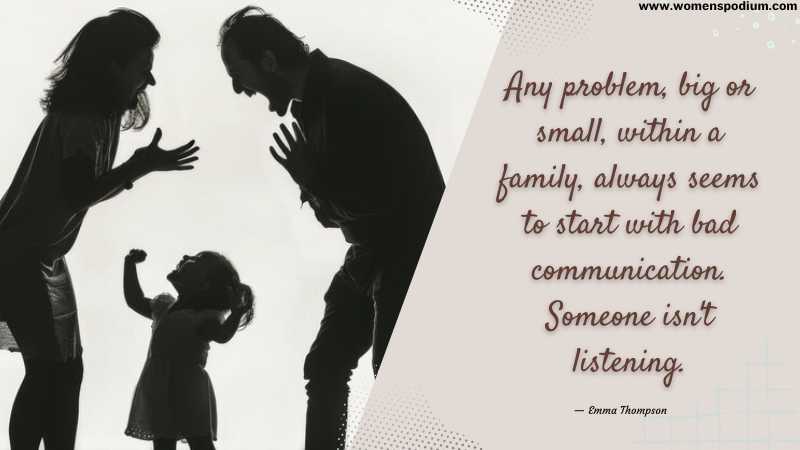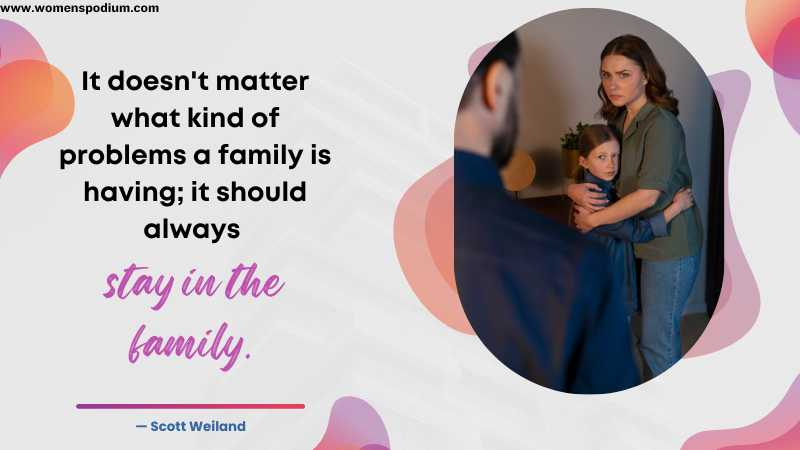
Families are our first source of contact with the outside world. They are often the first people who make the most resounding impact on us. The kind of family we are raised in influences our personality and the person we will become. However, there are problems in every family. Sometimes, these problems become hurdles and prevent the members of that family from living to their fullest potential. Such a family is undoubtedly a problematic or dysfunctional family.
All happy families resemble one another, each unhappy family is unhappy in its own way.
What is a Dysfunctional Family?

A dysfunctional family is a family in which conflict, misbehaviour, and often neglect or abuse on the part of individuals or groups occur continuously and regularly, leading other members to accommodate such actions. A dysfunctional family can also be one with multiple ‘internal’ conflicts, e.g. sibling rivalries, parent-child conflicts, domestic violence, mental illness, single parenthood, or ‘external’ conflicts, e.g. alcohol or drug abuse, extramarital affairs, gambling, unemployment-influences that affect the basic needs of the family unit.
Now, every family may experience some of these issues. The key to separating a family with a minor dysfunction from a family where dysfunctionality is a major threatening issue is to understand that the latter has a number of these issues together in a way that affects and hampers the physical, emotional, and psychological needs of the members.
Signs of Dysfunctional Families
While every family and culture is different and unique, here are some tell-tale signs of a dysfunctional family.
1. A Lack of Respect
Families will always have some topics on which they disagree. However, if these disagreements turn into personal attacks and involve ridiculing, demeaning, or putting another down, it hints at a lack of respect. A family where members do not respect each other regardless of age, gender, etc., can surely be on track to becoming dysfunctional.
2. A Struggle for Control
When every family member has to fight for their voice to be heard, it is natural that a struggle for control will ensue. This causes every person to try to control another, and therefore, no one can be themselves comfortably. This can affect decision-making, raising children, and all the other major and minor aspects of a family, leading to abuse and toxic relationships within families at times.
3. Fear of Expression
When the family members are not allowed to express themselves freely without inviting aggression or strained relationships, every member feels suppressed. The members of such a family may feel like they have no right to have an opinion, much less express one. Therefore, the fear of expression and the fear of being our own selves can be signs of a dysfunctional family.
4. Limiting Belief Systems
When one or more dominant family members impose their restrictive beliefs on the other members, it prevents the victim from excelling and progressing in their desired way.
5. Internal Issues Between Family Members
This might arguably be the most concerning factor about dysfunctional families. When two or more family members have unresolved issues preventing them from blending, it can wreak havoc on the whole family. These are not minor disagreements or even somewhat larger arguments; these issues stem from conflicts and firmly held grudges about the other person. When addressing such issues, if one person becomes insensitive and neglects to make the necessary efforts to resolve things with another, the situation can deteriorate into resentment, hatred, or even rage, which is a sure sign of dysfunctionality.
6. Inability to Move On or Adjust
When family members are unable to resolve their issues or are unwilling to adjust to each other, it becomes a cause of concern. Prolonged behaviour of this kind can lead to members being drawn apart and the family system collapsing.
7. Lack of Transparency and Accountability
As a family, all members need to be transparent with one another and need to be accountable to one another. This leads to greater cohesiveness and resilience in the family. Therefore, the absence of these factors can lead to an unhealthy environment in the family.
What Causes Problematic Families?

There are many causes of problematic families, and no family is wholly perfect or entirely imperfect or complicated. Sometimes, however, certain things can accentuate the problems of a family, making it more likely to be dysfunctional. Things like substance use, addiction, instability in relationships, abuse of any kind, legal or financial crises, etc., can lead to the behaviours mentioned above, leaving the families of such individuals at a higher risk of dysfunctionality.
Effects of Dysfunctional Families
Problems in the family affect each member, especially children. Children raised in such families are at a higher risk of inter-generational trauma and, therefore, carry these behaviour patterns within themselves. They may also suffer from self-esteem issues, leaving them vulnerable to challenges in their personal as well as professional lives. Each one’s experience of problematic families may be different; therefore, the effects are as unique as the experiences. It is important to know that every family might have some minor episodes of dysfunction sometimes; however, those do not make the family entirely dysfunctional.
How To Maintain Happiness In A Family
While this question will have different answers according to situations, its core lies in individual and collective responsibility. Each person in the family needs to be responsible and understand their role in holding the family together. In the face of problems, conflicts, and issues, this factor will ensure that a temporary conflict does not escalate to form a permanent scar.
How Do I Know if My Family is Dysfunctional, Broken, or Toxic?

Everyone loves their family and can go to any extent whenever their family needs them. It is good, but being observant is essential, too. Sometimes, the feeling of having a family is so much in your head that you miss seeing the real picture. You find yourself hurt and ignored, yet you seek your family over anything, which is not wise. No doubt, family is important, but if it leaves you empty, lost, and inefficient, then you must know that your family is not a happy family; it has some issues which are toxic and not good for your mental health.
1. All You See is an Argument
When you try to discuss something with your family, 8 out of 10 discussions turn into arguments without any result.
2. Sibling Jealousy
Your siblings try to compete with you and get jealous of your achievements. Although sibling jealousy is very common, you can’t take it just as it is. The bitter truth is for you to know that your family is toxic.
3. All That You See is Just Comparison
This can indeed hurt you when you observe that your parents compare you with your siblings most of the time. They are never happy with your decisions or encourage you to do better. Here, you must know that this is a clear-cut sign that your family is going down the lane of a dysfunctional family.
4. Judgmental and Overreaction
Even if you are genuinely late for a get-together or a family gathering, your family overreacts without knowing the real cause behind it. In short, they are always judgemental and overreact even to small things, which is a sure-shot sign of an unhappy family.
5. Interference and No Respect to Your Privacy
Your family always interferes with your life, despite knowing that you are a grown-up person now and quite adequate to take any decision wisely. In a nutshell, when they don’t respect your privacy and forget their boundaries, you must know that your family is dysfunctional.
6. When They Act as Victims
In some families, the grown-ups act like victims and often remind you how their lives were earlier. When they were your age, how they lived and survived and coped with their elders, how obedient they were, and much more. Make sure you don’t ignore this, accept that you are living with a toxic family.
7. Always a Big ‘No’
Expressing disappointment and disapproval without any valid reason, telling you that they are more experienced than you and can never be wrong as they are always right. This behaviour is undoubtedly toxic as it will leave you disappointed as if you cannot make the right decision.
8. When They Warn You
When parents or siblings give ultimatums or warnings for any task to be done on priority, they even call you anytime, ignoring whether you are busy at work or going out with friends. All they see is their work to be done first. This approach is purely selfish, certainly a trait of an unhappy family; you must not miss seeing these signs.
9. It’s All About Them Every Time
Whenever you talk to your siblings or parents in person or over a phone call, all they talk about is ‘themselves‘. The talk can be about their childhood or college days or workplace, anything that concerns them only, such as — What were their achievements? How did they surpass any adverse condition, likewise. They just clearly forget to ask about your things and how things are with you. Even on a phone call, it’s about them, not you. By doing this, they leave you exhausted every time you meet them or interact with your family members. This is a plain sight of a dysfunctional family.
How To Deal With A Dysfunctional Family

Dealing with a dysfunctional family is quite a big barricade. The ties of family are so into you that moving out from the unfavourable situation ain’t easy either. But if you are sensitive, you have to try hard to seek ways, as, believe it or not, ultimately, you will bear the loss. Knowing how to deal with a dysfunctional family is a must, and here are some ways you can try.
1. Review Your Explanation of Family
There are two types of people in a family:
- One is entitled to abuse (verbal or physical), violence, drama, manipulation, betrayal, emotional abuse, emotional withdrawal, neglect, ignorance, and passive-aggressiveness. They do this because they are related to you by blood or marriage with entitlement, designated as ‘family.’
- The other is always humble and obliged and tolerates any improper behaviour because, for them, family bonds are everything; all that matters to them is that they are related by blood or by marriage. They can be flexible and forgiving and always be there when the family needs them.
If you are the second type, you are the sufferer here because you are living with a dysfunctional family. And now is the time to define what a family is and how it affects your personality. A family is where you find:
- Peace and happiness when you are with them.
- Your opinion matters.
- You are physically and emotionally stable and safe when you are around them.
- The courage to face any obstacle.
If you find your family cannot give you peace, comfort, and strength, it’s high time for you to consider seeking for yourself. Don’t get settled for anything, do know this one fact they are not entitled to you, and you are not obligated to them.
2. Keep Your Expectations in Check
It is easy to say to cut ties from the family if it is broken or toxic. The best you can do is keep yourself in check and don’t expect much. You must know these two things:
- Dysfunctional families are relatively resistant to any changes.
- When you understand and accept reality, you can easily control your frustration over conflicts or disparities.
3. Less Talk and Keep Distance
To avoid an unfavourable situation in the family, try taking these baby steps:
- Try spending less time with your dysfunctional family.
- Talk less
- Share limited information about your personal life.
- Don’t tell them your whereabouts when outside.
- Set boundaries.
4. Let Go And Care for Yourself
If you were or are still a part of a dysfunctional family, know that you are not alone. We do not have the power to choose our families, so it is not our fault when we are subjected to problems from them. Acknowledge your responsibility to the family and work towards healing from the issues your family has caused.
You must learn coping skills if you can’t avoid your family how you want. Living with a dysfunctional family is not healthy, but the situation has helped you cope and endure the most challenging problem. They give you the strength to cope with stress, struggle, conflicts, rejection, and emotional combat. So, it is better to let go of the most intricate feelings and care for yourself; if you find it hard to face the ongoing challenging times, seek the help of your friends, therapist, or counsellor to come out of it to nurture your future. Remember these couple of things:
- Your life matters.
- Sometimes, letting go turns out to be a big healer.
- Your mental peace is important for your growth.
Although there are many ways to deal with a dysfunctional family, the above-mentioned are some of the best ways to cope if you have a broken family. You can cut all the bonds in a go, but you can limit it.
Quotes About Dysfunctional Family (Broken Families)
When I was doing my research on this article, I came across some interesting quotes defining broken families/dysfunctional families. I am pinning down some here in my article to make the picture more clear to you.
Here they go:
Any problem, big or small, within a family, always seems to start with bad communication. Someone isn’t listening.
— Emma Thompson

It doesn’t matter what kind of problems a family is having; it should always stay in the family.
— Scott Weiland

If you cannot get rid of the family skeleton, you may as well make it dance.
— George Bernard Shaw

One thing is crystal clear a dysfunctional family is any family with more than one person. We need to remember that every family is unique and has unique challenges. Overcoming these challenges together is important as a family. However, if your family becomes one of the biggest threats to you, make a wise decision and be sure to take your time and heal healthily.
Also Read: Many toxic families often neglect their children. This uninvolved parenting adversely affects the children and can trigger rude behaviour.






If the family is supporting, then only it has any meaning in your life. If a family is distressing you 24×7, leave them behind, life is one time, we can't sell to those who hell don't care about your feelings.
it was a long read, quite detailed n covered every minute details… unhappy family creates monsters👹